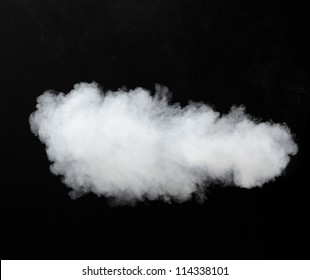One cause of white smoke from the exhaust might be the engine leaking coolant. If the engine leaks coolant, it will be burned by the heat of the engine and then come out as smoke from the exhaust. As the engine warms up and the condensation dissipates the white exhaust smoke (steam) is no longer seen. White smoke can be a big problem or not, depending on the thickness. When there is white smoke emitting from the exhaust system, that is a sign of coolant in the exhaust system.

Check the coolant level and see if its low. If the coolant is low, then check the engine oil and see if its milky. If the oil is milky then either the intake manifold gasket is leaking or the head gasket is burned. The white smoke and overheating is usually a sign of a blown cylinder head gasket. What does WHITE smoke from my exhaust mean?
Cars on a cold morning in the winter are going to generate a white vapor. If the white smoke still keeps coming out after the engine is nice and warm something may be wrong. After a recent oil change at the local Toyota dealer we noticed that when we start the car in the morning a puff of white smoke spews out from the exhaust for a few seconds and stops. There is no more white smoke while driving the car around. The car runs perfect and has no power loss.
Initially we had noticed it was losing coolant. If your car has a glow plug, the best way you should do is replacing it with a new one. When you start the car , the engine heats up, and these water droplets are emitted as white smoke. However, the white smoke persists it could mean that the coolant is leaking to the combustion chambers. A damaged head gasket or cracked engine block leak coolant.
If the car is not driven very far each day, some moisture will collect in the muffler and cause white smoke for a short while after starting. In this case, you will need to see a technician immediately. Idling sounds like prprprprpr at the exhaust. And how does the Mazda startmdash;same as usual? It takes time to start and there is an increase in fuel consumption.

Some white exhaust smoke is normal, especially when you first start the car. Condensation can turn to vapor, providing what looks like white exhaust. But excessive white smoke likely means coolant is leaking into the engine combustion chambers.
Exhaust coming from your vehicle’s tailpipe should be clear. When the car overheats for an extended period of time or is low on coolant (causing the temperature to rise), the severe heat can cause the cylinder head gasket to become compromised which causes oil to leak into the coolant and water to leak into the engine. Sometimes, white smoke does not emit from the exhaust while starting your car , it comes later when the car is on the run. The coolant can leak from a number of places, one of such is the coolant reservoir.

If the smoke is continual, however, you need to watch you coolant level as you may have a blown head gasket. This shows a coolant leak. In very cold weather when a diesel car has not warmed up, some white smoke is normal.
But if this condition continues to persist and there’s a loss in power, it indicates that the car is losing compression and hence belching white smoke. It depends from where it emitting it. As a rule, this would be a sign of an internal leak and the engine is burning coolant or transmission fluid. There are two common reasons for a diesel to produce smoky white coloured clouds from coolant leaks.

He said it is quite common for a car producing white smoke in morning because of internal combustion of remaining fuel in engine. And I should not worry about it. If there is a problem of oil and coolant mixing then car will continuously produce white smoke.
Black smoke comes from incomplete combustion.
No comments:
Post a Comment
Note: Only a member of this blog may post a comment.